Secretary of War Alex Ramsey transmits to Secretary of the Interior Carl Schurz a report from Lieutenant E. T. C. Richmond indicating that the transfer of the Carlisle Barracks from the War Department to the Interior was completed on January 6, 1880 and correspondence regarding said transfer. Also attached is an official order from Major…
1880-1889
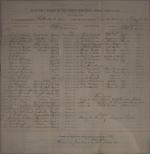
Report of the Carlisle Indian School, submitted quarterly to the Bureau of Indian Affairs by the School Superintendent, for the quarter ending September 30, 1887. Quarterly School Reports include lists of all currently enrolled and recently discharged students as well as information…
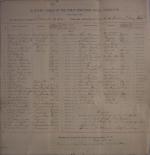
Report of the Carlisle Indian School, submitted quarterly to the Bureau of Indian Affairs by the School Superintendent, for the quarter ending December 31, 1887. Quarterly School Reports include lists of all currently enrolled and recently discharged students as well as information…
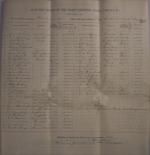
Report of the Carlisle Indian School, submitted quarterly to the Bureau of Indian Affairs by the School Superintendent, for the quarter ending March 31, 1888. Quarterly School Reports include lists of all currently enrolled and recently discharged students as well as information about…
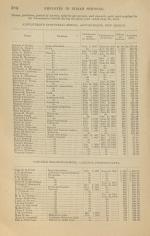
An excerpt from the Annual Report of the Commissioner of Indian Affairs to the Secretary of the Interior for the fiscal year ending 1888, containing a table of Indian School Employees for the Carlisle Indian Training School. The table includes employee name, position, service start and end dates…
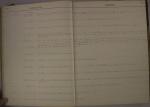
The Historical Record section of this Registers of Pupils lists students who attended the school between 1889 and 1894. This list, which appears on pages 193 through 274 of this register, has entries for 568 students. Most entries include the student's name, their Nation, age,…
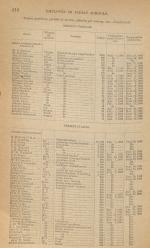
An excerpt from the Annual Report of the Commissioner of Indian Affairs to the Secretary of the Interior for the fiscal year ending 1889, containing a table of Indian School Employees for the Carlisle Indian Training School. The table includes employee name, position, service start and end dates…
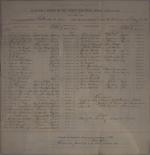
Report of the Carlisle Indian School, submitted quarterly to the Bureau of Indian Affairs by the School Superintendent, for the quarter ending September 30, 1891. Quarterly Report of School Employees include lists of all employees as well as information about their position, period of service,…
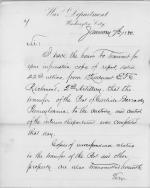

A card which records Richard Henry Pratt's appointment as Superintendent of an "Industrial School for Indians at Carlisle, Pa." Another note on the card indicates that Pratt's appointment was "transferred from the Appointment Division to the Indian Division" in December of 1888.
A page that accompanies this card indicates that Pratt's…
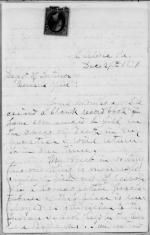
R. L. Sibbet, a citizen of Carlisle, asks why the Carlisle Indian School is employing a homeopathic physician instead of a doctor that practices "rational medicine."
Note: This item was copied from U.S. National Archives microfilm reels (M234), which were filmed from the original documents found in Record Group 75, Entry 79, "Letters…
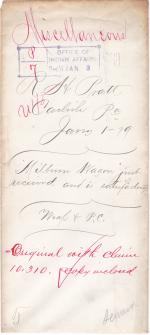
Richard Henry Pratt acknowledges receipt of a Milburn wagon. A note indicates that this is a copy of the original receipt.
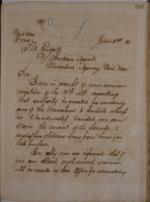
Instructions from Commissioner of Indian Affairs Ezra A. Hayt sent to Indian Agent S. A. Russell at the Mescalaro Agency to pursue gathering "six to ten boys" from the (Apache) Mescalero Tribe to send to the Carlisle Indian School or Hampton, "provided you can obtain the consent of the parents." Hayt instructed Russell to focus on selecting…
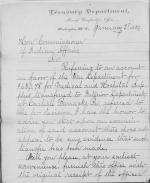
Comptroller W. W. Lipton refers to an account in favor of the War Department for $630.78 for medical and hospital supplies transferred to the Interior Department as part of the transfer of the Carlisle Barracks from the War to Interior to establish the Carlisle Indian School. Lipton states that he has no evidence that the transfer of medical…
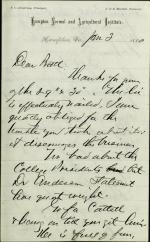
Samuel Chapman Armstrong of the Hampton Institute writes to Richard Henry Pratt about their efforts to build public support for their work via college presidents, notable figures, and newspaper articles.
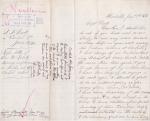
Richard Henry Pratt forwards to the Commissioner of Indian Affairs a letter from Olive Roberts, requesting employment as a teacher at the Carlisle Indian School. Roberts states that they previously ran the Crow Creek boarding school in Dakota. Pratt requests more information about Roberts, and notes that many of his teachers are giving up…
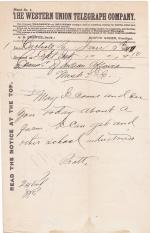
Richard Henry Pratt telegrams the Commissioner of Indian Affairs asking for permission to come to Washington that day to discuss school matters, including a farm and industrial training.
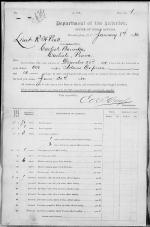
Commissioner of Indian Affairs Ezra A. Hayt sends Lieutenant Richard H. Pratt a six-month supply of two dozen different blank administrative forms used by the United States Indian Affairs division of the Department of the Interior. Pratt acknowledges the receipt of the stationary.
Note: This item was copied from U.S. National Archives…
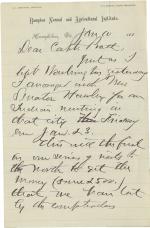
Samuel Chapman Armstrong of the Hampton Institute writes to Richard Henry Pratt informing him of a potential meeting between Armstrong and Senator Hawley to discuss money owed to Hampton by the government.
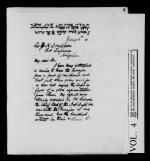
Letter from Pratt to Rev. A. H. Donaldson at Fort Defiance, Arizona, stating that he welcomes Navajo students at the school. He describes the religious affiliations of the staff and the role of religion at the school.
This material is from the Richard Henry Pratt papers, donated by his family to Yale University in 1959 and 1976.…
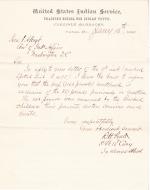
Richard Henry Pratt reports that the Rosebud delegation that visited Carlisle consumed 1,103 pounds of beef during their visit.

Lieutenant Richard H. Pratt acknowledges receipt of 24 dozen bottles of ink and one box by Adams Express.
Note: This item was copied from U.S. National Archives microfilm reels (M234), which were filmed from the original documents found in Record Group 75, Entry 79, "Letters Received by the Office of Indian Affairs, 1824-80."
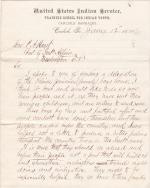
Richard Henry Pratt writes to Commissioner of Indian Affairs Ezra Hayt suggesting the return home of the former Ft. Marion prisoners, who had gone to Hampton and then Carlisle following their release. Pratt notes that they have been very helpful both at Carlisle and in general in generating good will among their people, and that sending them…
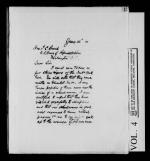
Pratt writes to Rep. Thaddeus C. Pound, sending him stereoviews of the students and providing information about their progress at the school. He notes that now that the work of the schoolroom is successfully underway they will begin fitting up the industrial shops. He observes that by selling the products of the school's industrial program to…
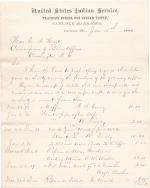
Richard Henry Pratt writes to Commissioner of Indian Affairs Ezra Hayt, requesting permission to purchase the listed supplies for the school. Some of the supplies had already been purchased for immediate use. The request includes construction materials, repairs to buildings and the ambulance, books, scientific and medical supplies, industrial…
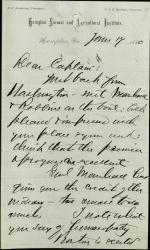
Samuel Chapman Armstrong of the Hampton Institute writes to Richard Henry Pratt discussing various individuals' views towards Indian education, as well as per capita rates.
